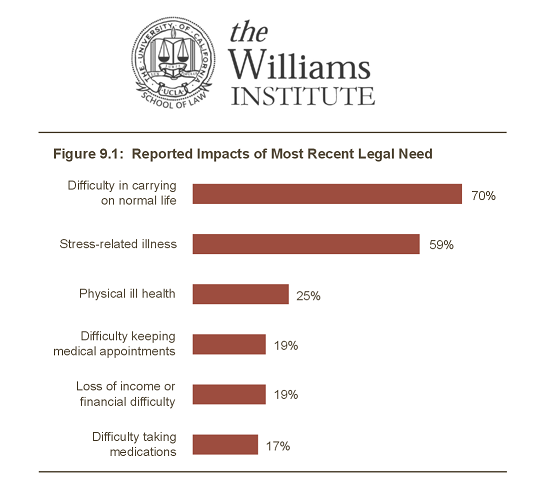Assessing the Need for Legal Services
 We have known for a long time that the legal needs of our clients are changing as the HIV/AIDS epidemic changes. We also know that in many studies examining the needs of people living with HIV, legal services is not always at the top of the list. How can this be, given that legal complications have such a monumental impact on the lives of our clients? From my experience, most people just do not anticipate the need for an attorney, and thus focus on other issues. Also coming into play is probably the public’s tendency to err on the side of caution when trusting attorneys and our sensitivity towards stigmatized subjects such as HIV.
We have known for a long time that the legal needs of our clients are changing as the HIV/AIDS epidemic changes. We also know that in many studies examining the needs of people living with HIV, legal services is not always at the top of the list. How can this be, given that legal complications have such a monumental impact on the lives of our clients? From my experience, most people just do not anticipate the need for an attorney, and thus focus on other issues. Also coming into play is probably the public’s tendency to err on the side of caution when trusting attorneys and our sensitivity towards stigmatized subjects such as HIV.
But now we have a study that will greatly shape our approach to legal services in the future. We can thank our colleagues at The Williams Institute, an independent research organization within UCLA School of Law, for taking on the challenging task of documenting how people living with HIV are (or are not) utilizing legal services. The results were surprising even for those of us who have been doing this work for a very long time. A stunning 98% of respondents indicated that they had at least one legal need in the year prior to the survey, but a mere 28% sought legal help, and only 16% received help from a lawyer.
Of course, different groups of people living with HIV have varying legal needs. For example, Latino clients often have disproportionately greater needs in the area of immigration law. Transgender women reported needing criminal law assistance more than other respondents, likely speaking to the fact that transgender women (regardless of HIV status) are incarcerated at a higher rate than the general population. But the study showed that there are some areas of law that impact the entire spectrum of people living with HIV, including housing, employment, and health care access. Many folks reported legal needs in multiple areas of law and astonishingly 85% of those surveyed did not have wills or advanced health care directives in place.
Despite this study showing prominent need, people in many areas of the country still do not have access to free and low cost legal services. Case in point, Southern California’s sole HIV specific legal services agency folded a few years back. Fortunately, because of ALRP’s extensive network of volunteer attorneys and our dedicated staff, people living with HIV in the Bay Area have greater access to legal assistance than most other HIV+ folks in the country. We are committed to ensuring that our clients continue to have access to justice.

